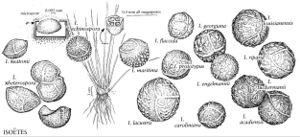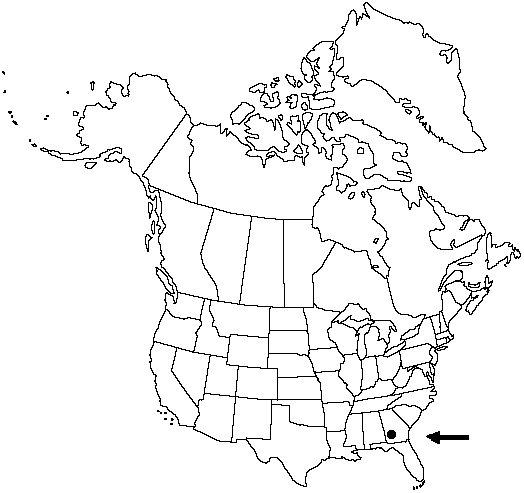Difference between revisions of "Isoëtes georgiana"
Amer. Fern. J. 82: 24. 1992.
imported>Volume Importer |
imported>Volume Importer |
||
| Line 46: | Line 46: | ||
|publication year=1992 | |publication year=1992 | ||
|special status= | |special status= | ||
| − | |source xml=https:// | + | |source xml=https://bitbucket.org/aafc-mbb/fna-data-curation/src/2e0870ddd59836b60bcf96646a41e87ea5a5943a/coarse_grained_fna_xml/V2/V2_309.xml |
|genus=Isoëtes | |genus=Isoëtes | ||
|species=Isoëtes georgiana | |species=Isoëtes georgiana | ||
Latest revision as of 20:22, 5 November 2020
Plants aquatic, emergent. Rootstock nearly globose, 2-lobed. Leaves deciduous, olive green, pale toward base, spirally arranged, to 40 cm., pliant, gradually tapering toward tip. Velum covering less that 3/4 of sporangium. Sporangium wall ± brown-streaked. Megaspores white, 450–650 μm diam., cristate to reticulate with broad, jagged ridges; girdle obscure. Microspores light brown in mass, 23–33 μm, papillose. 2n = 66.
Phenology: Spores mature late summer.
Habitat: Creeks
Discussion
Isoëtes georgiana is known only from Worth County, Georgia. An early collection from this locality was reported by B. M. Boom (1982) to be I. engelmannii x piedmontana, but the broad velum and bold texture of the megaspores suggest a possible involvement of I. flaccida.
Of conservation concern.
Selected References
None.

